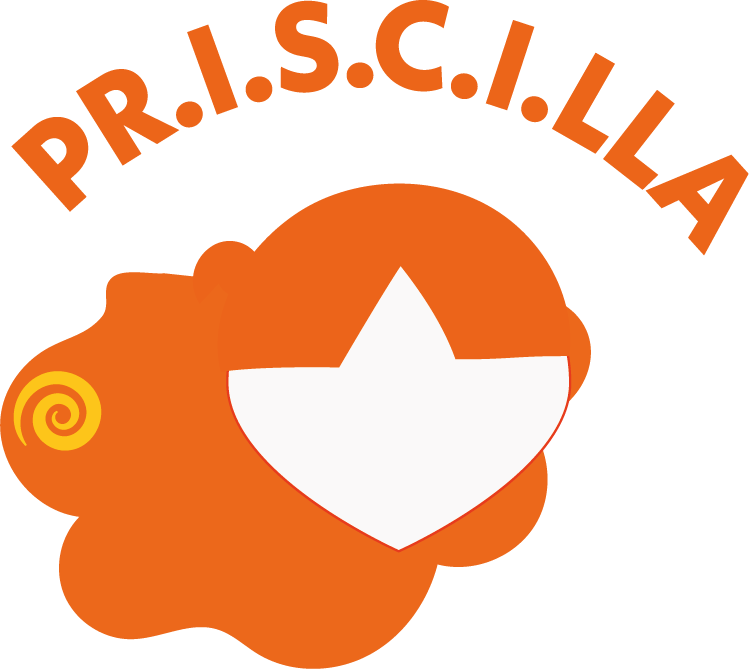The PR.I.S.C.I.L.LA project was developed to prevent and protect against the risks of sexual cyberbullying, a growing threat linked to the widespread use of social media. The initiative focuses on young people aged 18 to 25with intellectual disabilities, responding to the need to guide and support them in using social networks safely and responsibly. As part of this effort, a dedicated educational programme has been created, featuring modules on key topics related to online safety and digital wellbeing. Designed to be implemented in the various environments attended by young people with intellectual disabilities, the programme helps participants make the most of social media as a space for positive interaction, personal growth, and self-expression. Its goal is to empower young people strengthening their sense of identity, self- awareness, and self-esteem, while at the same time reducing the risks of sexual harassment and cyberbullying.
Structure of the educational programme
The educational principles at the heart of the programme include decision-making skills, self- determination, a sense of control, and the promotion of independence. The programme is based on a learning by doing approach, using engaging and practical methods that foster active participation and understanding. These include physical activities, visual supports, role-playing, practical exercises, and storytelling.
There are five modules:
- Relationship: Feeling good with Myself and Others: helps young people to better understand emotions and how they are expressed. Explains the differences between
friendship and love, the importance of loving oneself and making independent choices. It also discusses online and offline relationships, with examples of healthy behaviours and signs of toxicrelationships;
- Introduction to social media: teaches how to recognise the most common platforms, understand whypeople use them and how they communicate It presents useful behaviours for feeling safe, such as asking for help, using the tools available and knowing when something is wrong. It also reflects on how social media can be beneficial, but also create difficulties in relationships;
- Recognising dangers on social media: recognising the main online dangers, such as cyberbullying, grooming and data theft. Explains what these risks are and how to protect yourself;
- Staying safe when using social media: focuses on online privacy and why it is important to protect Itoffers practical advice on keeping your information safe and using social media in a safer and more responsible way. The aim is to promote digital independence and wellbeing;
- Finding solutions and asking for help: focuses on teaching young people what to do if they experience cyberbullying, with a particular focus on sexual harassment. The first part offers a practical step-by-step guide on what to do. The second part explains the
importance of building a network of trusted people, such as family members, friends and professionals,who can help and protect them.
These modules are expected to help young people with intellectual disabilities to: understand that social media can be useful but also harmful; recognise potentially risky situations when using social media; learn strategies forsafer media use; understand when and who to turn to for reporting and support.
The educational program is free and available in English, Italian, Macedonian, Greek, and Romanian. You can download it from the project website, in the “Results” section, at this link: https://priscillaproject.eu/results-2
Piloting of the educational programme
After the curriculum for the training programme for young people was validated by five National Boards and oneEuropean Board, the educational programme was piloted across the partner countries of the Europeanconsortium. The aim was to test its practical implementation, ensure its adaptability to different national contexts,and collect valuable feedback from the pilot phase.
In total, the testing phase engaged more than 82 young people with disabilities across five European countries. The results confirmed that, with targeted adaptations, young people with intellectual disabilities cansuccessfully address complex topics such as online safety and cyberbullying. Participants demonstrated increased confidence, understanding, and awareness. The use of clear language, familiar settings, andhands-on activities proved to be key factors in supporting their learning process.
The piloting carried out in the different partner countries highlighted several key achievements:
- Awareness of risks: significantly increased;
- Threat detection: stable and solid competences;
- Privacy and communication: concepts well understood;
- Security paradox: greater awareness leading to a lower perceived sense of safety;
- Problem-solving: high levels of confidence;
- Cyberbullying: more participants acknowledged having experienced
The training content also proved to be relevant for adults as well as for early teens, confirming the project’s potentialfor large-scale application. Its adaptability enabled active participation and stronger practical application ineveryday life. Moreover, the sessions contributed to a better understanding of interpersonal relationships, appropriate and inappropriate online behaviours, online risks, self-respect and respect for others, the use ofpolite language, and ways of seeking help. Creating a safe and non-judgmental environment encouraged open discussion on sensitive issues and supported participants in managing overly affectionate behaviours towards strangers.
The PR.I.S.C.I.L.LA project therefore proves that it is possible, through inclusive and interactive educational programmes, to offer young people with intellectual disabilities concrete tools to use social media in a safer and more informed way. The trial highlighted not only an increase in skills and confidence, but also the importance of combining knowledge with ongoing emotional support. With its innovative and adaptable approach, the project lays the foundations for large-scale dissemination, with the aim of creating safer, moreinclusive and respectful digital communities.
This press release is available in:


